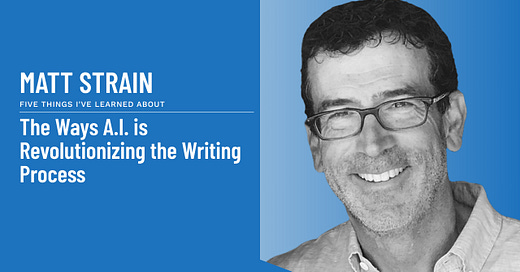A personal invitation from Matt Strain
Live this Sunday: Join me for "Five Things I've Learned about The Ways A.I. is Revolutionizing the Writing Process"
This Sunday: Join Adobe Research Lab veteran Matt Strain in this live, two-hour class and discover the Five Things He’s Learned about the ways artificial intelligence is helping writers find new ways to develop their ideas and cultivate their creativity.
I’m Matt Strain, and I want to invite you to my upcoming two-hour class, Five Things I’ve Learned about The Ways A.I. is Revolutionizing the Writing Process.
Most recently, I spent more than seven years in Adobe Research Lab, working as part of a team to explore the intersection of A.I. and creativity.
At Adobe, I worked with the scientists conducting the groundbreaking research, with product managers who converted this first-hand research into Adobe products, and with artists who incorporated the results of these efforts to create magic using Adobe tools. Work at the Adobe Research Lab took place in teams. But in every case, the focus of our research was intensely personal: we wanted to understand the best way that new tools could intimately change the way creative people work and express themselves.
In many ways, this wonderful time at Adobe has given me what today is an equally personal perspective from which to explore the current AI revolution. In response to A.I., we all will soon be re-considering what we think of as the natural boundaries of “creativity.” Already, technical professionals and thinkers are wrestling with the implications of terms like “computational creativity” and “augmented intelligence.” We’ve entered an era in which writers, artists, filmmakers, craftspeople of all kinds will soon also be be equally challenged with the creative – and even the ethical – consequences of this new technology.
As we enter the early stages of this new reality, I wish to share with you in my live upcoming class, Five Things I’ve Learned about the Ways A.I. is Revolutionizing the Writing Process. I’m eager to tell you what I know broadly about the coming A.I. revolution. But I’m even more eager to share with you what A.I. is going to mean for what to me still feels like our most intimate and personal means of communication. If you’re a writer, or if you’re someone cares about writing and reading, you likely already know that I’m talking specifically to you.
In this two-hour class, I’ll share with you the five most important things I’ve learned about the new collection of tools already changing what it means to create, to experience, and to write. These tools go well beyond the human support of editors and ghostwriters; every day, A.I.-infused grammar coaches grow more human-like, and technologies like ChatGPT get better and better able to summarize, translate, and generate new content.
It’s a lot to take in and make sense of. That’s why in our time together, I’ll share what I believe writers need to know most. Of course, the lessons extend well beyond writing – they’ll soon be impacting ever creative thinker no matter their medium.
I’ll share my take on:
A.I’.s current, most essential technologies: I’ll provide an as-up-to-the-moment understanding as I can of the technological systems that shape today’s best A.I. tools. My hope is that as a result you’ll be better able appreciate where these tools end and the work of humans still begins.
A.I. and writing: I’ll focus specifically on how A.I. can be thoughtfully incorporated into the work great writers already do – not to replace their efforts but to support them. I’ll provide an update on the available approaches and technologies genuinely useful to writers’ brainstorming and research, as well programs that can help writers better draft, edit, and proofread their work.
A.I. and publishing: I’ll share A.I.’s potential to help transform tasks now relegated almost entirely to publishers – efforts now more accessible than ever thanks to A.I.. I’ll suggest A.I.’s potential role in designing a book’s interiors and its cover, as well as technology’s increasing capacity to help streamline and scale a work’s publishing, marketing, and distribution.
A.I’.s legal and ethical consequences: I’ll tackle the legal issues that A.I. now requires us all to reconsider – fundamental issues like intellectual property and ownership. And I’ll also suggest some of the broader ethical implications of the A.I. revolution.
A.I’.s broader consequences for writers and citizens: I’ll reflect on what A.I. could mean not just for the future of writing but for the future of human creativity, particularly the many possibilities and the concerns that come with automation. (It really is going to be a brave new world, especially for writers!)
I’ve given this all some thought, but I’m most happy that I’ve not been thinking all on my own. Already, I’ve solicited the ideas and approaches of the folks who joined me for my first Five Things I’ve Learned class, Five Things I’ve Learned about Getting Started with A.I. – for Real People, and many of their suggestions have directly shaped the ideas and practices I hope to share with you. I hope that you, too, will think of this session as a collaborative gathering of our collective wisdom. You’ll have a chance to provide input in the days before our class begins, and again when we’re together. I look forward to sharing ideas with fellow writers and – I hope – with technologists and A.I. industry leaders who will also be in attendance for this live class.
My goal is to leave you with a concrete understanding of A.I.’s role in writing and publishing, as well as a better nuanced view of the broader discussions surrounding AI and humanity.
Whether you are a seasoned author or someone just curious about the possibilities A.I. offers, I hope this session will be your gateway to writing’s new frontier.
Please join me in exploring, learning, and connecting.
-Matt Strain




